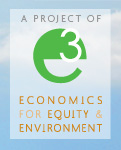About
The scientific community has reached near universal agreement that human economic activity has a discernible impact on the global climate system and that warming of the climate system is unequivocal. The risks of climate change are real and the damages may be irreversible.
As the debate over climate and energy policy intensifies, economic analysis is playing an increasingly central role. The case for inaction on climate change is less likely to be argued on the grounds of skepticism about the science; instead, some have claimed that it will be too expensive to take more than token initiatives. There is now extensive economic analysis in the peer-reviewed literature and in reports by reputable economists working for universities, government agencies, think tanks, and non-profits that rigorously supports immediate, large-scale policy responses to the climate crisis.
The transition from a fossil-fuel based economy raises important economic questions. The answers to those questions should be rooted in a firm understanding of the science and a commitment to social equity.
The articles, reports, analyses and commentaries included here generally reflect and build on the following principles:
- Risk and uncertainty are fundamental to the climate problem; the magnitude and the irreversibility of uncertain, but possible, worst-case climate impacts dominate the analysis of policy options.
- Ethics and equity are inseparable from economic analysis; there are deep questions of fairness between rich and poor today, and between present and future generations, at stake in the debate.
- The severity of the problem and the scope of the required response are so great that marginal analysis of small changes and modest adjustments of market-based instruments are inadequate to the task of understanding and protecting the earth’s climate.

